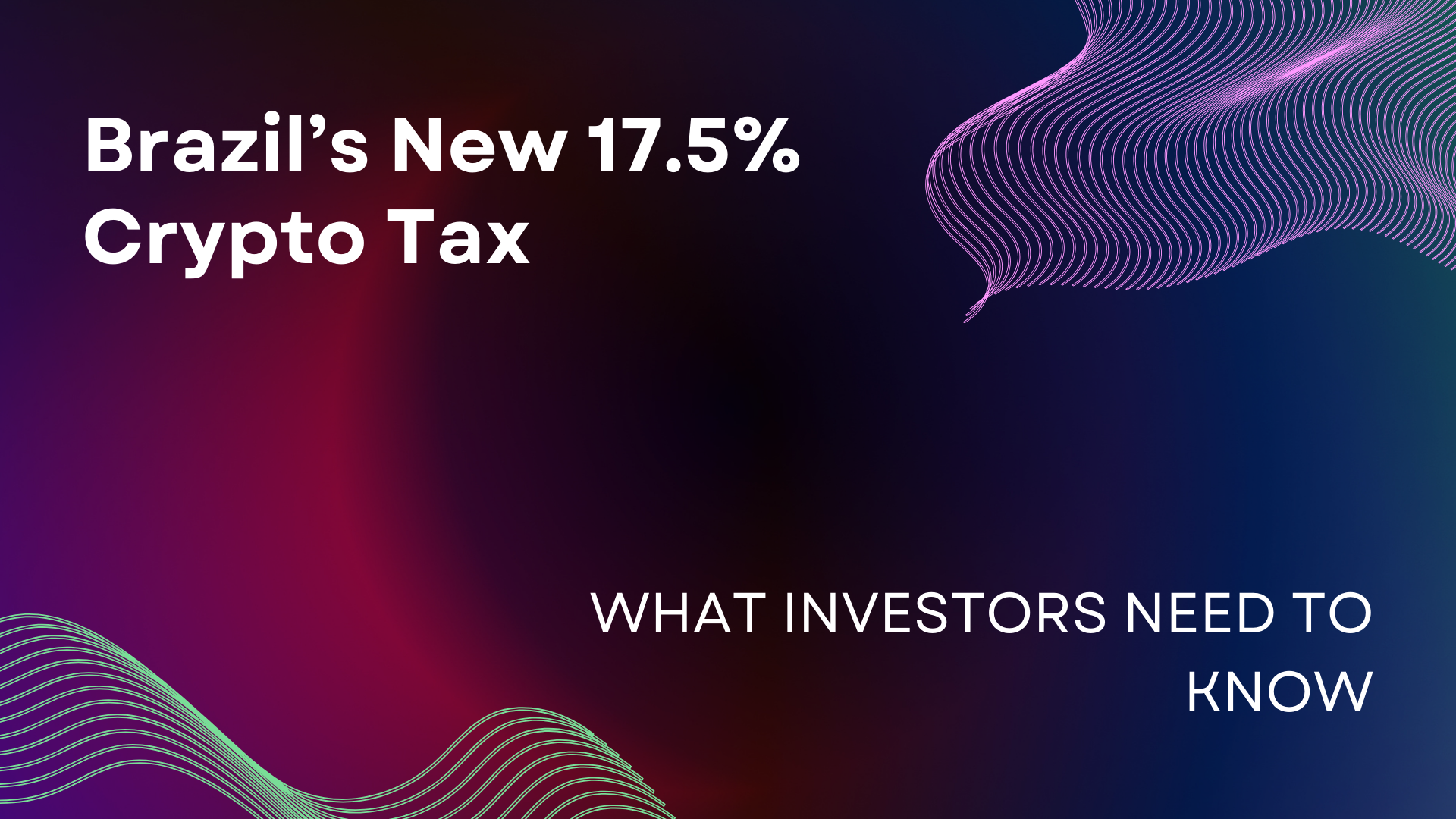
Brazil has moved to overhaul how it taxes digital assets. A Provisional Measure (MP 1303) issued by the government introduces a flat 17.5% income-tax rate on financial investments and crypto assets, replacing the prior bracket system and eliminating the long-standing tax exemption for crypto sales up to R$35,000 per month. The measure is part of a wider fiscal package and takes effect provisionally pending congressional approval.
What’s actually changing
- Flat 17.5% rate. The measure unifies the rate on investment income and capital gains—including digital assets—at 17.5%, replacing the 15%–22.5% scale that depended on holding period and size of gain. Reuters and the government’s own summary highlight the shift to a single rate across asset classes.
- No more R$35,000 monthly exemption. Crypto gains that were previously exempt when monthly sales stayed at or below R$35,000 are now taxable at 17.5%. The Senate’s explainer explicitly notes the end of this relief for crypto.
- Scope covers offshore and self-custodied assets. The government’s text and legal analyses place crypto assetsinside the unified investment framework—regardless of whether they’re held on a local exchange, overseas, or in self-custody.
- Timing and implementation. As a Provisional Measure, MP 1303 has immediate effect but must be converted into law by Congress to remain in force. EY’s technical alert notes that withholding mechanics for financial investments are slated from 1 January 2026, so taxpayers should watch for transitional rules and the final legislative text.
Why Brazil is doing this now
The crypto change is embedded in a broader fiscal package designed to boost revenue after the government adjusted plans around the IOF (a financial operations tax). Finance officials also flagged simplification—a single rate across investments and fewer distortions—as a policy goal.
It lands against a market backdrop where stablecoin use has surged in Brazil (both consumer payments and on/off-ramps), strengthening the case for tighter, clearer tax collection on digital assets.
Who’s most affected
- Small/casual traders: The biggest near-term change is the loss of the R$35k/month exemption. Under the old system many hobbyists paid nothing; now any realized gain is taxed at 17.5%. CoinDesk’s reporting and Cointelegraph’s explainer both underline that the burden shifts toward smaller accounts.
- Large investors: High-volume traders previously facing the 22.5% top bracket could see lower tax on large gains under the flat 17.5% regime—though net impact depends on offsets and the final law.
Compliance isn’t new—reporting rules already exist
Brazil has required detailed crypto reporting since 2019 under RFB Normative Instruction 1,888/2019. Key points:
- Monthly reporting to the tax authority (e-CAC) is required when transactions occur outside Brazilian exchanges and exceed R$30,000 in a month, or when transactions are done off-exchange. The rule also mandates annual asset reporting.
- Layout updates to the “Declaração sobre Operações com Criptoativos” took effect in 2024, reflecting ongoing tweaks by Receita Federal (the tax authority).
In short: the data pipeline is already in place. The new 17.5% rate mostly changes how much you owe, not whether the government can see the activity.
How it fits into the bigger fiscal puzzle
Officials framed the measure as part of a package to strengthen public accounts—raising betting levies, unifying investment taxation, and tightening corporate tax offsets. Lawmakers still need to sign off, and some have pushed back in favor of spending cuts. Expect negotiations before a final text emerges.
Practical takeaways for crypto users in Brazil
- Assume gains are taxable at 17.5% unless/until Congress carves out exceptions in the final law. The R$35k exemption is gone under MP 1303’s current wording.
- Keep meticulous records. Wallet addresses, dates, amounts, fiat equivalents (PTAX), fees—the items listed in IN 1,888/2019. This is essential for calculating capital gains and proving basis.
- Mind offshore and self-custody. Location no longer helps from a tax perspective; reporting obligations already extend beyond local exchanges.
- Watch the transition period. Some withholding rules for investment income start from 2026, per EY; the income-tax liability on gains will follow what Congress enacts as it converts the MP. Coordinate with a Brazilian tax adviser.
- Expect more scrutiny of foreign exchanges. The tax authority has signaled continued engagement with offshore platforms regarding cooperation and data sharing.
What to watch next
- Congressional timeline. Provisional Measures lapse if not approved within statutory deadlines (extensions are possible). Track committee reports and any amendments that fine-tune crypto treatment.
- Guidance from Receita Federal. Look for FAQs or normative updates clarifying calculation methods, loss offsets, and the mechanics for reporting under the new regime.
- Market effects. Retail behavior may shift as the small-trade exemption disappears; stablecoin usage trends and exchange volumes are key signals.
Conclusion
Brazil’s plan to tax all crypto gains at 17.5% and scrap the R$35k/month exemption is a major pivot toward simpler—but in many cases higher—tax bills for everyday users. The measure is live provisionally, with technical implementation (including withholding for certain investments) staged into 2026. Keep records tight, follow congressional progress, and get localized advice before the next tax season.